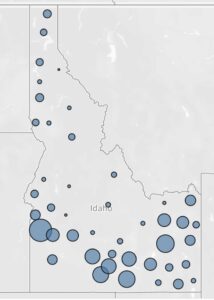Environmental Justice in Idaho: Farmworker Justice
Editor’s note: This post was authored by Lauren Noeker. Lauren served as ICL’s Andrus Scholar in 2022. Lauren lives in Boise, Idaho, and is contributing to the ICL blog for a series on Environmental Justice. This is part 3 of 3 in the series. Read post 1 here, and post 2 here.
Agriculture is a cultural lifeblood of Idaho, and the single largest contributor to Idaho’s economy. Behind the scenes of this industry are the folks who spend hours and hours every day out working the fields – farmworkers. Without these dedicated workers, we wouldn’t have food on our tables each day. Farmworkers are vital to our economy and communities, and they should be treated as such. However, they face injustices across the country and right here in Idaho. A farmworker is a seasonal employee who works in the fields tending to and harvesting produce. The majority of farmworkers in the United States are of Latinx origin, coming from countries in Central and South America. Immigrants make up roughly 40% of Idaho’s farming and fishing industry workforce. Many Latinx workers in Idaho, documented or not, do not have the same protections as other workers – adding social and legal stressors into their jobs. Unfortunately, although these individuals are essential for agricultural production, they also face some of the biggest injustices of any group in the state. The daily work of farmworkers is long and hard. These individuals are in the fields before dawn, and spend the day doing hard physical labor or harvesting, weeding, digging irrigation ditches, and hauling containers of harvested goods, among other tasks. Compensation for these workers varies – some is based upon productivity (quantity of procure harvested) or hourly, but average income is generally around $20,000. On top of challenging work tasks, farmworkers face challenging conditions.Little or no shade in the fields often means unbearable temperatures out in the sun, and having little or restricted access to fresh water often leads to dehydration, heat stroke, and heat exhaustion. Farmworkers can also be inadvertently sprayed with pesticides used on the fields they are working, some of which are known to result in adverse health effects. The expectations of supervisors can also put extreme stress and pressure on farmworkers to keep working with little or no exceptions, which can compromise the health and safety of farmworkers.
A farmworker is a seasonal employee who works in the fields tending to and harvesting produce. The majority of farmworkers in the United States are of Latinx origin, coming from countries in Central and South America. Immigrants make up roughly 40% of Idaho’s farming and fishing industry workforce. Many Latinx workers in Idaho, documented or not, do not have the same protections as other workers – adding social and legal stressors into their jobs. Unfortunately, although these individuals are essential for agricultural production, they also face some of the biggest injustices of any group in the state. The daily work of farmworkers is long and hard. These individuals are in the fields before dawn, and spend the day doing hard physical labor or harvesting, weeding, digging irrigation ditches, and hauling containers of harvested goods, among other tasks. Compensation for these workers varies – some is based upon productivity (quantity of procure harvested) or hourly, but average income is generally around $20,000. On top of challenging work tasks, farmworkers face challenging conditions.Little or no shade in the fields often means unbearable temperatures out in the sun, and having little or restricted access to fresh water often leads to dehydration, heat stroke, and heat exhaustion. Farmworkers can also be inadvertently sprayed with pesticides used on the fields they are working, some of which are known to result in adverse health effects. The expectations of supervisors can also put extreme stress and pressure on farmworkers to keep working with little or no exceptions, which can compromise the health and safety of farmworkers.  While Idaho has a long history of agriculture, the future of the industry faces uncertainty. Climate change poses many threats to agriculture operations and farmworkers alike. As we begin to see the effects of climate change here in Idaho, farmworkers will feel the impacts more strongly than others. Hotter and longer heat waves, longer and more intense wildfire seasons, and drier summers will be felt firsthand by those in the fields. The higher temperatures, more intense sun exposure, and smoke inhalation that leads to increased physical stress on farmworkers highlights an environmental justice issue – when certain individuals or communities are disproportionately bearing the negative consequences of climate change.
While Idaho has a long history of agriculture, the future of the industry faces uncertainty. Climate change poses many threats to agriculture operations and farmworkers alike. As we begin to see the effects of climate change here in Idaho, farmworkers will feel the impacts more strongly than others. Hotter and longer heat waves, longer and more intense wildfire seasons, and drier summers will be felt firsthand by those in the fields. The higher temperatures, more intense sun exposure, and smoke inhalation that leads to increased physical stress on farmworkers highlights an environmental justice issue – when certain individuals or communities are disproportionately bearing the negative consequences of climate change. Many of us who value eating locally don't interact regularly with the workers who make it possible for us to have local food on our tables. Without them, agriculture wouldn’t be as efficient nor productive as it is. Farmworkers are the backbone of agricultural success in Idaho, and need to be better protected and treated.You can help fight for environmental justice in Idaho by standing up for our farmworkers. You can do that in many ways, including learning about their contributions and work, speaking out to local and state leaders to reform working conditions in the fields, and providing assistance when possible. That can include buying organically grown produce to reduce farmworkers’ exposure to toxic chemicals, or participating in a charitable drive to provide necessities like gloves, hats, and other protective equipment for farmworkers. For more information on helping farmworkers, check out the Idaho Immigrant Resource Alliance page about agriculture and food. The Idaho Immigrant Resource Alliance seeks social justice by providing relief and resources to these communities through the creation of a new support system model for our Latinx, immigrant and Indigenous communities. You can follow their social media account here.Addressing these injustices will not only improve the lives of farmworkers and their families, but will also move the Gem State closer to a sustainable and just future for all Idahoans.
Many of us who value eating locally don't interact regularly with the workers who make it possible for us to have local food on our tables. Without them, agriculture wouldn’t be as efficient nor productive as it is. Farmworkers are the backbone of agricultural success in Idaho, and need to be better protected and treated.You can help fight for environmental justice in Idaho by standing up for our farmworkers. You can do that in many ways, including learning about their contributions and work, speaking out to local and state leaders to reform working conditions in the fields, and providing assistance when possible. That can include buying organically grown produce to reduce farmworkers’ exposure to toxic chemicals, or participating in a charitable drive to provide necessities like gloves, hats, and other protective equipment for farmworkers. For more information on helping farmworkers, check out the Idaho Immigrant Resource Alliance page about agriculture and food. The Idaho Immigrant Resource Alliance seeks social justice by providing relief and resources to these communities through the creation of a new support system model for our Latinx, immigrant and Indigenous communities. You can follow their social media account here.Addressing these injustices will not only improve the lives of farmworkers and their families, but will also move the Gem State closer to a sustainable and just future for all Idahoans.

